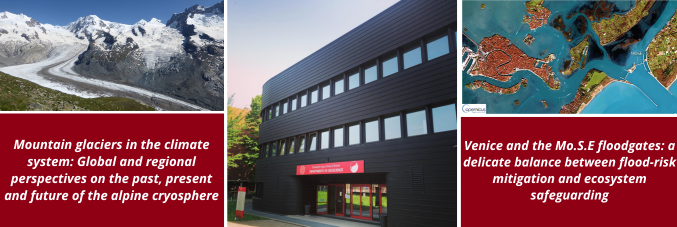
Seminari Progetto di Eccellenza - 19 Dicembre
Relatore: Dott.Lukas Rettig | Giovedì 19 Dicembre 2024 ore 16.30 - Aula Arduino Relatore: Dott.Alvise Finotello | Giovedì 19 Dicembre 2024 ore 17.00 - Aula Arduino
19.12.2024
Mountain glaciers in the climate system: Global and regional perspectives on the past, present and future of the alpine cryosphere
Several of the most important societal challenges of the 21st century are connected to the accelerating retreat of mountain glaciers in a globally warming atmosphere. Meltwater from glaciers and ice caps is one of the largest contributors to present and future sea-level rise. The gradual disappearance of permanent ice in arid and semi-arid world regions will cause communities in these areas to face increasing probability of water shortages and vulnerability to drought events. And rising temperatures may contribute to a higher frequency or magnitude of natural hazards such as glacial lake outburst floods or ice avalanches.
With the urgent need to respond to these challenges, knowledge of past glacier fluctuations is becoming increasingly relevant. In this seminar, we will first discuss some basic physical properties of glacier-climate relationships and then examine how the responses of glaciers to past climatic changes can be reconstructed from geological evidence. How can we use geomorphological mapping to infer the extent of past glaciations? How can we date glacial sediments and landforms and construct reliable chronologies of ice advance and retreat? And how do glacier fluctuations reflect changes in atmospheric circulation over time? Using examples from current research projects at the Department of Geosciences and its partner institutions we will explore these questions and discuss the role of the geoscientist in addressing them.
Venice and the Mo.S.E floodgates: a delicate balance between flood-risk mitigation and ecosystem safeguarding
Venice and its lagoon are notoriously vulnerable to climate change-induced sea level rise and the intensification of extreme events. As the frequency of urban flooding increased alarmingly since the second half of the 20thcentury, a series of mobile barriers were constructed at the three inlets of the lagoon to temporarily seal it off from the Adriatic Sea and prevent flooding from extreme high tides. This ~6 billion € system, known as Mo.S.E. (short for Experimental Electromechanical Module), became operational in the fall of 2020.
While Mo.S.E. has proven effective in safeguarding Venice from flooding, and despite floodgate closures lasting only for relatively short periods, the artificial reduction of peak tide levels during these closures can significantly impact water circulation and sediment transport dynamics within the lagoon, potentially leading to long-term cascading effects on the entire lagoon’s ecosystem.
This seminar will discuss the pros and cons of the Mo.S.E. system and highlight the urgency of finding a balance between the opposing need to reduce flood risk to preserve Venice's economy and cultural heritage while simultaneously safeguarding the unique ecosystem that sustains the city and its socioeconomic activities.
While sustainable management strategies for the Mo.S.E. that balance human and ecological needs are feasible, the anticipated rise in mean sea level highlights the urgency of exploring and implementing additional safeguarding measures soon. These efforts could provide valuable insights not only for Venice but also for other coastal cities around the world threatened by the impacts of climate change.
- Seminar - Mountain glaciers in the climate system: Global and regional perspectives on the past, present and future of the alpine cryosphere - Dr. Rettig Download
- Seminar - Venice and the Mo.S.E floodgates: a delicate balance between flood-risk mitigation and ecosystem safeguarding - Dr. Finotello Download





